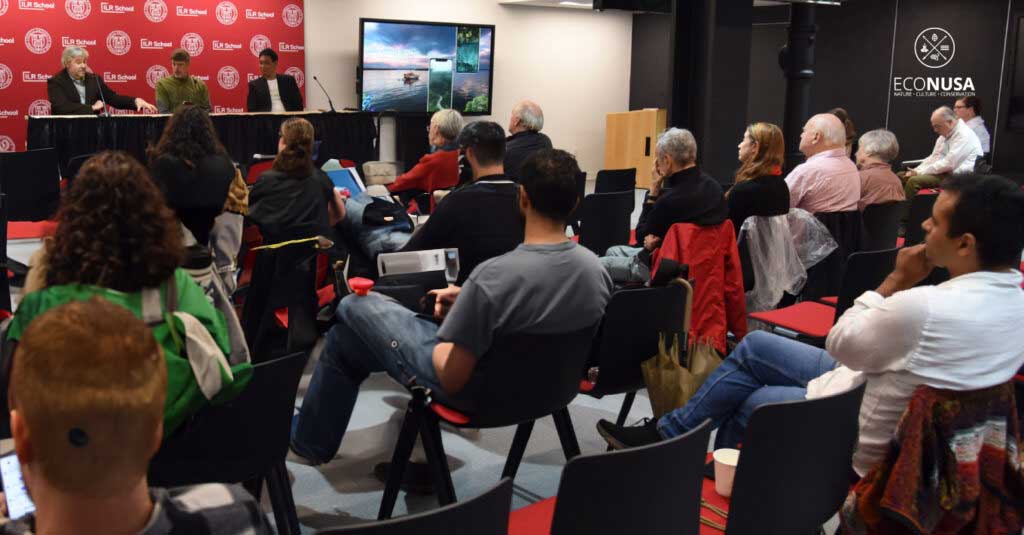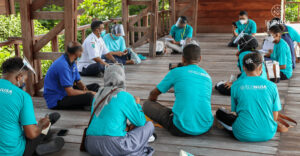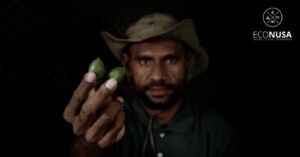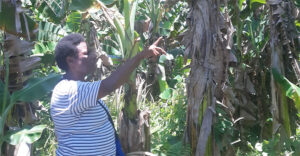
The land of Papua showcases a rich and varied ecosystem, serving as a home to a wide array of biodiversity. It plays a significant role in supporting the livelihoods of local communities and holds global importance in both economic and social aspects. Moreover, it stands as a vital resource for the world’s pursuit of sustainable living and contributes to the fight against the climate crisis. The indigenous peoples of the land of Papua, with their longstanding presence in this region, have a cultural heritage dedicated to the preservation and safeguarding of this paradise on earth.
The collaborative initiatives involving indigenous and local communities, alongside EcoNusa Foundation in Papua and the Maluku Islands, have received a favorable reception from the international audience following the activities during New York Climate Week 2023. Positive narratives highlighting the richness of biodiversity, a wide range of local wisdom and culture, various initiatives, and the collective work of indigenous communities and local populations in Papua to safeguard the Eastern Indonesian paradise were prominently featured in several discussions.
Teaming up with the Cornell Lab of Ornithology, an insightful discussion titled “Advancing Climate Ambition through the Protecting Biodiversity and Community in Eastern Indonesia” took place on September 23, 2023. The event began with a captivating video that displayed the stunning beauty of Papua. Despite the relentless rain in New York City on that day, the enthusiasm remained undiminished, with about 40 attendees actively participating in the discussion.
Read also: Travelling while Preserving Cenderawasih Bird
“The forests in eastern Indonesia, particularly in Papua, are of immense importance to our planet. These forests also serve as crucial habitats for the iconic birds of paradise,” said Tim Laman, a wildlife journalist and photographer. Tim shared his experience of visiting the land of Papua documenting the stunning beauty of the endemic birds while working on the Birds of Paradise Project alongside Ed Scholes. Tim explained, there are still many bird species yet to be discovered and identified within the dense forests of Papua. These hidden species play a vital role in preserving the richness of biodiversity and the ecosystem balance in the land of Papua, Indonesia, and the world.
At the same occasion, Bustar Maitar, the CEO of the EcoNusa Foundation, conveyed how indigenous communities in the land of Papua have upheld and nurtured their natural surroundings for a significant duration, guided by their wealth of local wisdom and traditions. Bustar emphasized the importance of inclusive collaboration, “What should be the foremost concern for Papua? We can facilitate and support the mapping of indigenous territories, thus reinforcing the rights and self-governance of indigenous communities and local populations. This approach enables them to attain greater self-sufficiency and well-being.”
Bustar pointed up the inseparable connection between environmental preservation and the prosperity of indigenous communities, highlighting their mutual support. By safeguarding the forests and oceans, the well-being of indigenous and local communities can be effectively maintained. It’s essential to continue empowering and strengthening the economic capacity of these communities, as this ensures their ongoing commitment to environmental protection. Through these efforts, the forests and seas can be utilized sustainably, free from damaging and extractive practices, ultimately contributing to climate preservation.
Read also: Protecting Papua and Maluku Forests Not Only About Birds-of-Paradise Preservation
Tim and Ed added that they did not just capture the allure and wonder of the birds of paradise but also witnessed how indigenous communities coexist harmoniously with their surroundings. Forests and oceans have always been seen as the nurturing “Mama” to the indigenous communities, as the main source in providing all their essential needs. Ed Scholes emphasized that safeguarding Papua’s forests and natural environment is equivalent to protecting the livelihoods of indigenous people and local communities. Regrettably, he noted that there hasn’t been sufficient global attention directed toward preserving the natural heritage in this far eastern corner of Indonesia. “I hope that the increasing support for empowering indigenous communities to preserve their environment will further enlighten the world to the importance of safeguarding the integrity of Papua’s forests and environment,” Ed explained.
The richness of the forest ecosystem, the home of the birds of paradise, as well as the initiatives of indigenous and local communities in the land of Papua, received a warm and positive reception from the attendees. Suzan, a participant and birdwatcher, expressed her delight and increased interest in visiting Papua. “I followed this discussion with the hope of learning more about locations for observing birds of paradise. This discussion has been fascinating, and I’m pleased to be able to learn more,” said Suzan.
Read more: Tim Laman, Ed Scholes, and Prof. Charlie D Heatubun in MACE Defending Paradise
Positive narratives about Papua also emerged during the discussion titled “How Do We Safe the World’s Rainforests Through Scalable Grassroot Solutions” on September 22nd. Positive response from the audience received for the notion of how indigenous communities in Papua inherit local wisdom from their ancestors, providing a solution in preserving nature and reducing negative impacts of climate crisis, as conveyed by Bustar. Furthermore, Bustar emphasized the importance of encouraging the global market to choose sustainable products directly produced by indigenous communities. This plays a vital role in connecting these communities with the world, enabling local economies to thrive and fostering well-being.
“We must focus on solutions, and through KOBUMI, we are striving to provide concrete solutions that can support the well-being of indigenous people and local communities in the land of Papua. In doing so, when indigenous communities thrive, the environment is preserved, and this is also part of our efforts to combat the climate crisis,” concluded Bustar.
This year New York Climate Week took place on September 17th-24th, 2023. During this event, stakeholders ranging from environmental leaders, governments, businesses, politicians, activists, academics, and representatives of civil society from various backgrounds and across generations gathered to discuss the climate crisis, promote climate action, and accelerate the transition and progress in the fight against the climate crisis, moving towards a sustainable Earth.
Contributor: Nur Hayyu
Photos: Jessica Alexandra Suarez – Cornell Lab Ornithology




